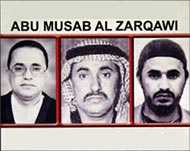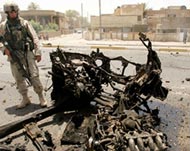US forces in fresh Iraq offensive
The US military says it has killed about 50 fighters as it presses on with two assaults in the western Iraqi province of Anbar near the border with Syria.

Saturday’s offensive came on another day of violence in the country which saw attacks on Iraqi soldiers and the shooting of a correspondent for Arabic television channel Al Arabiya.
Operation Spear and Dagger follow similar sweeps this year in the same Euphrates valley area, including one in early May.
For a second day, a force of about 1000 US marines and Iraqi soldiers scoured the Karabilah region in search of fighters and weapons.
“Approximately 50 insurgents have been killed since the operation began yesterday morning,” US Captain Jeffrey Pool said on Saturday.
There was no independent confirmation of the casualties.
Pool said the troops had found four Iraqis who had been beaten, handcuffed and chained to a wall in a bunker in the town.
Operation Spear
Operation Khanjar came a little over 24 hours after the launch of Operation Spear around the towns of Karabila and al-Qaim, about 20km west of the Syrian border, an area US forces believe has become a conduit for foreign fighters and weapons.
Air strikes killed about 50 anti-US fighters over the past two days, the military said, adding three Americans were wounded. Dozens of people were detained.
|
“The number of US snipers has increased during the past week. Innocent victims fall dead every day” Abd al-Khaliq al-Rawi, |
Doctors in the town of al-Qaim said they had received 20 bodies and many more wounded.
However, Abd al-Khaliq al-Rawi, director of communications in al-Qaim, denied the presence of any fighters in the city.
He said a two-day civil disobedience campaign started in al-Qaim on Saturday “in protest against the daily random killings taking place in the city by US snipers”.
“The number of US snipers has increased during the past week. Innocent victims fall dead every day,” he told Aljazeera.
Fleeing residents
Most residents of Karabila have fled the town, heading towards al-Qaim, he added.
“Some of the citizens have left dead bodies of their relatives under the debris of their homes, which have come under the US bombing for no reason.”
 |
|
Abu Musab al-Zarqawi may be |
When asked if there were any fighters or resistance activities in the city, al-Rawi said the area was completely calm before the beginning of the US operation.
Nevertheless, US forces believe that Abu Musab al-Zarqawi, who they blame for some of Iraq’s deadliest attacks, may be in hiding in the western desert.
The area is a stronghold of Saddam’s Sunni Arab community where mistrust of the new, US-backed Shia-led government runs deep.
There have been four major operations in the region since the beginning of May, underscoring the task US forces face.
Baghdad sweep
In Baghdad, General William Webster, the US commander for the capital, and Brigadier General Jaleel Khalaf, commander of the first Iraqi army brigade given charge of its own section of the city, said hundreds of raids on suspects over the past month had succeeded in halving the number of car bombings in the capital.
Some 1200 suspects have been detained, they told a news conference. About 50 of those arrested were foreigners.
|
“Certainly saying anything about ‘breaking the back’ or ‘about to reach the end of the line’ or those kinds of things do not apply to the insurgency at this point” General William Webster, |
But Webster cautioned the operation would go on, as anti-US fighters remained capable of mounting deadly assaults – albeit, he said, for shorter periods than before.
“Certainly saying anything about ‘breaking the back’ or ‘about to reach the end of the line’ or those kinds of things do not apply to the insurgency at this point,” Webster said.
US commanders’ forecasts that anti-US fighters were about to be defeated have been disappointed and generals on the ground have spoken of late of “cyclical” violence, as US offensives cause fighters to lie low or move from one area to another.
“It’s like hunting birds,” said Colonel Steve Davis of the US Marines as he surveyed the ruins of what he said was an “insurgent” base in Karabila. “You shoot a few, the rest fly away. You shoot a few again, the rest fly away again.”
Iraqi soldiers wounded
General Khalaf, whose brigade US officers say is a model for the Iraqi army they hope can relieve them, criticised US politicians calling for a timetable for a troop withdrawal.
US firepower would be needed for some time to come, said Khalaf, once a general in Saddam’s army. “Those who want a date have no understanding of military issues,” he added.
In Karabila, a town of 60,000, several buildings were damaged by shelling but there was little sign of residents, apart from some white surrender flags flying from homes.
 |
|
There was more anti-US violence |
The US military command this week blamed al-Zarqawi for a surge in violence since the Shia and Kurdish-dominated government took power in April, with more than 1000 Iraqis and around 120 US troops killed in attacks since then.
On Saturday, a car bomb exploded next to an Iraqi army convoy in western Baghdad, wounding six Iraqi soldiers, and a roadside bomb blew up near a US convoy, killing a young child and wounding two other civilians, police and hospital officials said.
Armed men also shot and seriously wounded a correspondent for Arabic television channel Al Arabiya during an apparent kidnap attempt in central Baghdad, the station said.
In Tuz Khurmatu, 200km north of Baghdad, clashes on Friday killed two US soldiers and two Iraqis, the US military said. The rising US death toll, now at least 1718, may help explain mounting concern in the US.